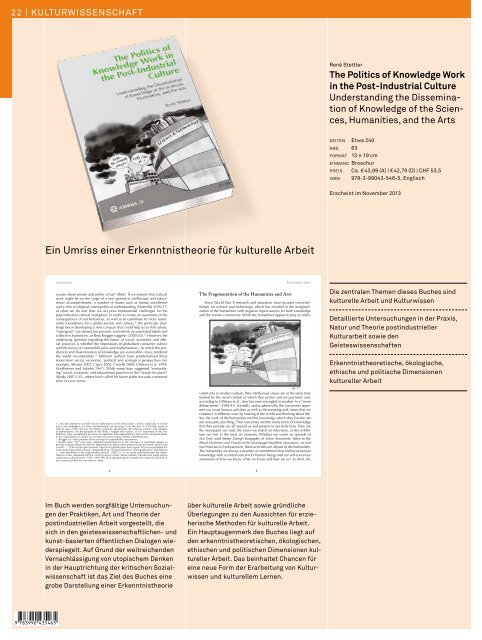Verlagsvorschau Herbst 2013 - Ambra Verlag
Verlagsvorschau Herbst 2013 - Ambra Verlag
Verlagsvorschau Herbst 2013 - Ambra Verlag
Erfolgreiche ePaper selbst erstellen
Machen Sie aus Ihren PDF Publikationen ein blätterbares Flipbook mit unserer einzigartigen Google optimierten e-Paper Software.
22 | Kulturwissenschaft<br />
René Stettler<br />
The Politics of Knowledge Work<br />
in the Post-Industrial Culture<br />
Understanding the Dissemination<br />
of Knowledge of the Sciences,<br />
Humanities, and the Arts<br />
Seiten Etwa 240<br />
Abb. 63<br />
Format 13 × 19 cm<br />
Einband Broschur<br />
Preis Ca. € 43,99 (A) | € 42,79 (D) | CHF 53,5<br />
ISBN 978-3-99043-546-5, Englisch<br />
Erscheint im November <strong>2013</strong><br />
Ein Umriss einer Erkenntnistheorie für kulturelle Arbeit<br />
chapter i<br />
course about private and public virtue” (Ibid.). If we assume that cultural<br />
work might be on the verge of a new period of intellectual and educational<br />
accomplishment, a number of issues such as human excellence<br />
and a new ecological-cosmopolitical understanding (Sloterdijk 2010:37)<br />
of what we do and how we act pose fundamental challenges for the<br />
post-industrial cultural workplace. In order to create an awareness of the<br />
consequences of our behaviour, as well as to contribute to more sustainable<br />
foundations for a global society and culture, 20 the particular challenge<br />
lies in developing a new compass that could help us to shift values,<br />
“reprogram” our destructive pursuits, and rethink accumulated habits and<br />
collective aspirations, as Reto Ringger suggests (2009:20). 21 However, the<br />
underlying question regarding the future of social, economic and ethical<br />
practices is whether the imperatives of globalised consumer culture<br />
and the forces of commodification and marketization—to which the production<br />
and dissemination of knowledge are vulnerable—have rendered<br />
the world incontestable. 22 Different authors have problematised these<br />
issues from social, economic, political and ecological perspectives (for<br />
example, Altvater 2007; Capra 2002; Castells 2000; Gibbons et al. 1994;<br />
Horkheimer and Adorno 1947). While some have suggested “remoralising”<br />
social, economic and educational practices in the “search for place”<br />
(Banks 2007:145), others have called for future paths towards a renewed<br />
ethic of civic virtue.<br />
20 I do not attempt to provide much elaboration on the term culture, which, especially in recent<br />
years, has undergone yet more transformations of meaning. I use the term in a broader sense to<br />
refer to ways of life, the arts, the media, political, educational and religious culture, and attitudes<br />
to globalization. For the purpose of this book, I suggest that culture, as it is expressed in the arts,<br />
literature, film, and different practices of mediation and representation, draws from and participates<br />
in the construction of culture as a system of human values, beliefs and behaviours.<br />
21 Ringger is a Swiss pioneer of the concept of sustainability investments.<br />
22 Banks notes: “Yet, even now, ongoing transformations in the structure of capitalism appear to<br />
provide cultural industries with the opportunity to obtain even greater shares of wealth, power, and<br />
control (...) [T]he social and economic impacts of globalization now appear to have exacerbated the<br />
scale and scope of the cultural ‘standardization, commercialization, and rigidification’ that Adorno<br />
(...) first identified in the high-modern period” (2007:25). In an essay published after his death,<br />
Adorno in fact reiterated that the “entire practice of the culture industry transfers the profit motive<br />
naked onto cultural forms” (1981; 1991:99), thus anticipating the commercial control of all kinds of<br />
social practices that we can observe today.<br />
The Fragmentation of the Humanities and Arts<br />
Introduction<br />
Since World War II research and education have focused overwhelmingly<br />
on science and technology, which has resulted in the marginalization<br />
of the humanities with negative repercussions for both knowledge<br />
and the human community. While the humanities appear to play an ambi-<br />
Fig. 1.1<br />
valent role in modern culture, their intellectual values are at the same time<br />
formed by the social context in which they evolve and are practised, and,<br />
according to Gibbons et al., thus become entangled in markets in a “more<br />
diffuse sense” (1994:91). Formally and academically, the humanities represent<br />
our usual human activities as well as the meaning and values that we<br />
construct in different ways by looking at the world and thinking about life.<br />
Yet, the work of the humanities and the knowledge which they involve are<br />
not one particular thing. Their outcomes and the many forms of knowledge<br />
that they provide are all around us and present in our daily lives. They are<br />
the newspaper we read, the news we watch on television, or the exhibition<br />
we visit in the local art museum. Whether we watch an episode of<br />
Star Trek, read Stefan Zweig’s biography of Marie Antoinette, listen to the<br />
Ritual Orchestra and Chants of the Khampagar Buddhist Monastery, or visit<br />
San Francisco’s Exploratorium, these activities are all part of the humanities.<br />
The humanities are always a manner of commitment that embraces human<br />
knowledge with a central concern for human beings and our self-conscious<br />
awareness of how we know, what we know and how we act. In short, the<br />
Die zentralen Themen dieses Buches sind<br />
kulturelle Arbeit und Kulturwissen<br />
Detaillierte Untersuchungen in der Praxis,<br />
Natur und Theorie postindustrieller<br />
Kulturarbeit sowie den<br />
Geisteswissenschaften<br />
Erkenntnistheoretische, ökologische,<br />
ethische und politische Dimensionen<br />
kultureller Arbeit<br />
2 3<br />
Im Buch werden sorgfältige Untersuchungen<br />
der Praktiken, Art und Theorie der<br />
postindustriellen Arbeit vorgestellt, die<br />
sich in den geisteswissenschaftlichen- und<br />
kunst-basierten öffentlichen Dialogen wiederspiegelt.<br />
Auf Grund der weitreichenden<br />
Vernachlässigung von utopischem Denken<br />
in der Hauptrichtung der kritischen Sozialwissenschaft<br />
ist das Ziel des Buches eine<br />
grobe Darstellung einer Erkenntnistheorie<br />
über kulturelle Arbeit sowie gründliche<br />
Überlegungen zu den Aussichten für erzieherische<br />
Methoden für kulturelle Arbeit.<br />
Ein Hauptaugenmerk des Buches liegt auf<br />
den erkenntnistheoretischen, ökologischen,<br />
ethischen und politischen Dimensionen kultureller<br />
Arbeit. Das beinhaltet Chancen für<br />
eine neue Form der Erarbeitung von Kulturwissen<br />
und kulturellem Lernen.



